- Home
- Arthur Miller
The Penguin Arthur Miller
The Penguin Arthur Miller Read online
THE PENGUIN ARTHUR MILLER
In the history of postwar American art and politics, Arthur Miller casts a long shadow as a dramatist of stunning range and power, an accomplished writer of fiction, memoir, and screenplays, and an engaged public intellectual. Miller’s life and work hold a mirror up to America and its shifting values. His body of work consists of plays from across the decades spanning the 1930s to the new millennium, creating what biographer Christopher Bigsby calls “an alternative history of a troubled century.” These plays are of their time yet timeless: bound not in realism, but the product of, in Miller’s own words, “a dream rising out of reality.” At his core, he was a humanist fundamentally devoted to the moral responsibility of one person to another, an interest that manifested in both a concern for the private individual and the public experience. He was not a moralist but a man of deep moral conscience. Miller believed in the need to confront ourselves continually, and his plays represent a belief in the obligation of theater and art to help us do so. To this worldview, he brought psychological perspicacity, remarkably fluid dialogue, and an abiding sense of humor. Little wonder, then, that he remains among the most widely read and produced playwrights of any century.
The Penguin Arthur Miller celebrates the Arthur Miller centennial, honoring a near-matchless creative and intellectual legacy. Beginning with his quiet debut, The Man Who Had All the Luck—now recognized as containing the stirrings of genius—and All My Sons, the follow-up that established him as a major talent, this volume collects the breadth of Miller’s plays. From career hallmarks like The Crucible and Death of a Salesman, to later works like Mr. Peters’ Connections and Resurrection Blues, the range and courage of Miller’s moral and artistic vision are here on full display.
“Here we find the true compassion and catharsis that are as essential to our society as water and fire and babies and air. I remember walking and running and jumping out of the theater after seeing Death of a Salesman, like a child in the morning, because Miller awakened in me the taste for all that must be—the empathy and love for the least of us, out of which bursts a gratitude for the poetry of these characters and the greatness of their creator.”
—Philip Seymour Hoffman
“I think you can tell from his plays whether a writer loves actors. Arthur gives you tap dances. He gives you arias.”
—Dustin Hoffman
“Arthur was the last of the three great theatrical voices of the American century—O’Neill, Williams, Miller.”
—David Hare
“[Miller] has looked with compassion into the hearts of some ordinary Americans and quietly transferred their hope and anguish to the theatre.”
—Brooks Atkinson
PENGUIN CLASSICS DELUXE EDITION
THE PENGUIN ARTHUR MILLER
ARTHUR MILLER (1915–2005) was born in New York City and studied at the University of Michigan. His plays include All My Sons (1947), Death of a Salesman (1949), The Crucible (1953), A View from the Bridge and A Memory of Two Mondays (1955), After the Fall and Incident at Vichy (1964), The Price (1968), The Creation of the World and Other Business (1972), and The American Clock (1980). His other works include Focus, a novel (1945); The Misfits, a cinema novel (1961); and the texts for In Russia (1969), In the Country (1977), and Chinese Encounters (1979), three books in collaboration with his wife, photographer Inge Morath. His memoirs include Salesman in Beijing (1984) and Timebends, an autobiography (1987). His short fiction includes the collection I Don’t Need You Any More (1967), the novella Homely Girl, A Life (1995), and Presence: Stories (2007). His later work includes the plays The Ride Down Mt. Morgan (1991), The Last Yankee (1993), Broken Glass (1994), and Mr. Peters’ Connections (1999); Echoes Down the Corridor: Collected Essays, 1944–2000; and On Politics and the Art of Acting (2001). Among numerous honors, he received the Pulitzer Prize for Drama and the John F. Kennedy Lifetime Achievement Award.
LYNN NOTTAGE is a Pulitzer Prize–winning playwright and a screenwriter. Her plays have been produced widely in the United States and throughout the world. They include Sweat; By the Way, Meet Vera Stark (Lilly Award, Drama Desk nomination); Ruined (Pulitzer Prize, OBIE Award, Lucille Lortel Award, New York Drama Critics’ Circle Award for Best Play, Audelco, Drama Desk Award for Outstanding Play, and Outer Critics Circle Award); Intimate Apparel (American Theatre Critics and New York Drama Critics’ Circle Awards for Best Play); Fabulation, or The Re-Education of Undine (OBIE Award); Crumbs from the Table of Joy; Las Meninas; Mud, River, Stone; Por’knockers; and POOF!
BY ARTHUR MILLER
PLAYS
The Golden Years
The Man Who Had All the Luck
All My Sons
Death of a Salesman
An Enemy of the People
The Crucible
A View from the Bridge
After the Fall
Incident at Vichy
The Price
The Creation of the World and Other Business
The Archbishop’s Ceiling
The American Clock
Playing for Time
The Ride Down Mt. Morgan
Broken Glass
Mr. Peters’ Connections
Resurrection Blues
Finishing the Picture
ONE-ACT PLAYS
A View from the Bridge (one-act version)
A Memory of Two Mondays
Fame
The Reason Why
Elegy for a Lady (in Two-Way Mirror)
Some Kind of Love Story (in Two-Way Mirror)
I Can’t Remember Anything (in Danger: Memory!)
Clara (in Danger: Memory!)
The Last Yankee
SCREENPLAYS
Playing for Time
Everybody Wins
The Crucible
The Misfits
MUSICAL
Up from Paradise
AUTOBIOGRAPHY
Timebends
REPORTAGE
Situation Normal
In Russia (with Inge Morath)
In the Country (with Inge Morath)
Chinese Encounters (with Inge Morath)
Salesman in Beijing
FICTION
Focus (a novel)
Jane’s Blanket (a children’s story)
The Misfits (a cinema novel)
I Don’t Need You Any More (stories)
Homely Girl, A Life (a novella and stories)
Presence: Stories
COLLECTIONS
Arthur Miller’s Collected Plays, Volumes I and II
The Portable Arthur Miller
Arthur Miller: Collected Plays 1944–1961 (Tony Kushner, editor)
Arthur Miller: Collected Plays 1964–1982 (Tony Kushner, editor)
Arthur Miller: Collected Plays 1987–2004 with Stage and Radio Plays of the 1930s and 40s (Tony Kushner, editor)
ESSAYS
The Theater Essays of Arthur Miller (Robert A. Martin, editor)
Echoes Down the Corridor: Collected Essays, 1944–2000 (Steven R. Centola, editor)
On Politics and the Art of Acting
VIKING CRITICAL LIBRARY EDITIONS
Death of a Salesman (Gerald Weales, editor)
The Crucible (Gerald Weales, editor)
PENGUIN BOOKS
An imprint of Penguin Random House LLC
375 Hudson Street
New York, New York 10014
penguin.com
Foreword copyright © 2015 by Market Road Films, LLC
Penguin supports copyright. Copyright fuels
creativity, encourages diverse voices, promotes free speech, and creates a vibrant culture. Thank you for buying an authorized edition of this book and for complying with copyright laws by not reproducing, scanning, or distributing any part of it in any form without permission. You are supporting writers and allowing Penguin to continue to publish books for every reader.
Copyright notices for Arthur Miller’s plays.
LIBRARY OF CONGRESS CATALOGING-IN-PUBLICATION DATA
Miller, Arthur, 1915–2005.
[Plays. Selections]
The Penguin Arthur Miller : collected plays / Arthur Miller ; foreword by Lynn Nottage.
pages cm.—(Penguin Classics Deluxe)
ISBN 978-1-101-99197-8
I. Title.
PS3525.I5156A6 2015
812’.52—dc23
2015024812
CAUTION: Professionals and amateurs are hereby warned that performance of these dramas is subject to a royalty. It is fully protected under the copyright laws of the United States of America, Canada, United Kingdom and the rest of the British Commonwealth, and of all countries covered by the Berne Convention for the Protection of Literary and Artist Works, the Pan-American Copyright Conventions, the Universal Copyright Convention, and of all countries with which the United States has reciprocal copyright relations. All rights, including but not limited to professional and amateur stage rights, motion picture, recitation, lecturing, public reading, television and radio broadcasting, video and sound recording, and the rights of translation into foreign languages are strictly reserved. Particular emphasis is placed upon the matter of readings, permission for which must be secured in writing. Inquiries should be addressed to ICM Partners, 730 Fifth Avenue, New York, NY 10019.
Cover art: Riccardo Vecchio
Design and art direction: Paul Buckley
Version_1
Contents
About THE PENGUIN ARTHUR MILLER
Praise for Arthur Miller
About the Author
Also by Arthur Miller
Title Page
Copyright
Foreword: Letter to a Young Playwright by LYNN NOTTAGE
A Note on the Text
THE PENGUIN ARTHUR MILLER
The Man Who Had All the Luck
All My Sons
Death of a Salesman
An Enemy of the People
The Crucible
A View from the Bridge
After the Fall
Incident at Vichy
The Price
The Creation of the World and Other Business
The Archbishop’s Ceiling
The American Clock
Playing for Time
The Ride Down Mt. Morgan
The Last Yankee
Broken Glass
Mr. Peters’ Connections
Resurrection Blues
Copyright Continued
Foreword
Letter to a Young Playwright
Dear Young Playwrights,
As a young playwright grappling with concerns about content, form, and structure, there were of course numerous places that I’d turned to for guidance and inspiration, but repeatedly I found myself retreating to a well-worn volume of The Collected Plays by Arthur Miller. The collection occupied an honored place on my bookshelf alongside the other seminal American playwrights of the twentieth century: Lillian Hellman, Lorraine Hansberry, Tennessee Williams, Clifford Odets, and August Wilson. But, in many respects, I learned my craft by reading the plays of Miller, dissecting the careful way he used the poetry of everyday speech to shape and interrogate his characters. I marveled at how effortlessly he conjured the worlds of ordinary men, transforming the minutiae of their day-to-day lives into epic tragedies. I found his plays to be like soul music, fusing the bitter truth of history with the urgency and incendiary spirit of a generation eager to be heard. He wrote from a place of passion and conviction, never passive about his belief that drama should have social impact. He used the small rebellions and conflicts of the common man in order to stage a larger conversation with history.
I found myself drawn to Miller’s work because he wrote with a sense of purpose—an evangelical fervor rooted in his overarching concern about the shifting moral fault lines that threatened to fracture the foundation of American culture in the twentieth century. Indeed, Miller never backed away from the social issues of the day, mining his own misgivings and frustrations to create plays that probed the complexities of a flawed society. He had great empathy for the disaffected souls that hovered on the edges of darkness, light-seekers trying to negotiate a world that was rapidly redefining itself in the aftermath of the Depression and World War II.
There is perhaps no other playwright of his era who devoted as much time and care to dramatizing the anxieties, aspirations, and sacrifices made by men in pursuit of the elusive American dream. He understood that theater had the potential to be more than a frivolous divertissement; it could be a powerful social art, designed to instigate and unsettle, and ultimately pry people out of their complacency.
To me the theatre is not a disconnected entertainment, which it usually is to most people here. It’s the sound and the ring of the spirit of the people at any one time. It is where a collective mass of people, through the genius of some author, is able to project its terrors and its hopes and to symbolize them.
—Arthur Miller in a speech he delivered at the University of Michigan, February 28, 1967
Born in New York City in 1915 to Jewish parents, Miller came of age in Brooklyn during the Depression. Throughout the 1920s, the Millers enjoyed a relatively affluent lifestyle, but as a teenager Arthur experienced the devastating impact of the stock market crash. After the failure of his father’s garment company, his family faced considerable financial hardship. Miller witnessed, firsthand, the erosion of the American dream. His early teenage struggles shaped his subsequent worldview. Throughout his youth Miller worked hard to make a living and eventually willed his way into the University of Michigan, where he began to discover his voice as a writer. Very quickly he gravitated toward theater, which at the time was a hotbed of radical thought.
For a number of years Miller patched together a living writing radio plays, rejecting more lucrative commercial opportunities in Hollywood to work for the government-administered Federal Theatre Project. It’s important to note that his path to success was circuitous and not without a few major bumps in the road. His first Broadway play in 1944, The Man Who Had All the Luck, failed to excite critics and had an embarrassingly short run. These setbacks remind us that a playwright is shaped not only by how one copes with success, but, also as important, how the playwright rebounds from failure. Three years after his first Broadway premiere, Miller finally achieved his first critical success with a highly acclaimed production of All My Sons directed by Elia Kazan. It garnered the New York Drama Critics’ Circle Award and established him as a force to be reckoned with. All My Sons was a realistic postwar drama about a businessman, Joe Keller, who makes the ill-fated decision to sell defective airplane parts to the military during World War II. His questionable action provides financial security for his company but has tragic repercussions for his family. Keller places capitalist concerns over those of his community, and in doing so destroys the integrity of his family. In All My Sons, Miller begins to examine the underlying tension between characters who are victims of their own moral shortcomings, and characters who are destroyed because of their moral convictions. These themes will remain prominent threads running throughout his entire body of work.
Several years after the success of All My Sons, Miller again tackled the psychology of a failed businessman in the Pulitzer Prize–winning Death of a Salesman. Here, Miller departs from the stark realism of All My Sons to engage a new theatrical vocabulary that reflects the inner turmoil of his central character, Willy Loman. He create
s a dramatic structure that captures the interiority of Loman’s chaotic and deteriorating mind. The past is precariously interwoven with the present, like a tenacious vine that is slowly choking the life out of its host tree. In a candid interview in the New Yorker Miller explains what he was seeking to dramatize in Loman’s character:
Failure in the face of surrounding success. He was the ultimate climber up the ladder who was constantly being stepped on. His fingers were being stepped on by those climbing past him.
Loman is an unfortunate idealist. He fails to evolve with the changing demands of the world, but the real tragedy lies in the fact that he is too blinded by an unattainable dream to recognize his own myopia. Death of a Salesman is Miller’s masterwork, as it firmly established him as one of the preeminent playwrights of his era.
In the late 1940s, the House Un-American Activities Committee (HUAC) began to aggressively target the left-leaning theater community. Many in Miller’s inner circle found themselves under direct attack. Instead of retreating, Miller wrote an adaptation of Henrik Ibsen’s An Enemy of the People as a way of speaking out against the badgering and bullying of the creative and intellectual communities. The play was a resounding failure with the public. Perhaps the adaptation hit too close to home to attract mainstream Broadway audiences. Nevertheless, as the Cold War atmosphere of paranoia and fear continued to sweep the country, Miller wrote The Crucible, a timely allegory about the 1692 Salem witch trials. The play took as its subject the corruption of power and the insidious way in which fear can reshape a community’s notion of reality. At the center is the character John Proctor, a decent man with a flawed past, who comes to recognize the hypocrisy and greed of those in power, yet refuses to give in to their demands and thereby sacrifice his integrity and good name.
As a general rule, to which there may be exceptions unknown to me, I think the tragic feeling is evoked in us when we are in the presence of a character who is ready to lay down his life, if need be, to secure one thing—his sense of personal dignity. From Orestes to Hamlet, Medea to Macbeth, the underlying struggle is that of the individual attempting to gain his “rightful” position in his society.

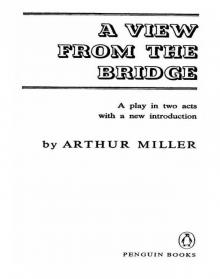 A View From the Bridge: A Play in Two Acts
A View From the Bridge: A Play in Two Acts Broken Glass
Broken Glass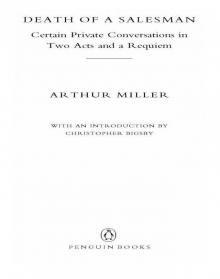 Death of a Salesman
Death of a Salesman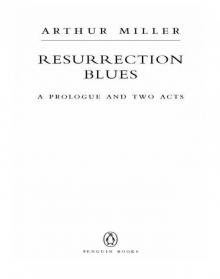 Resurrection Blues
Resurrection Blues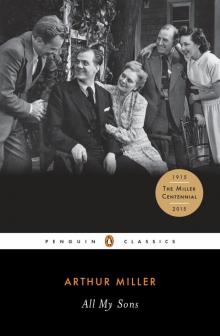 All My Sons
All My Sons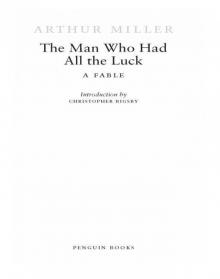 The Man Who Had All the Luck
The Man Who Had All the Luck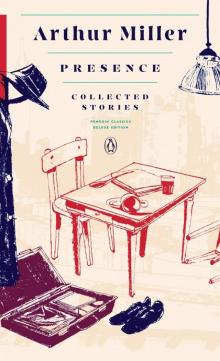 Presence: Stories
Presence: Stories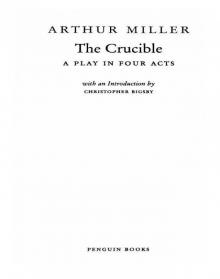 The Crucible
The Crucible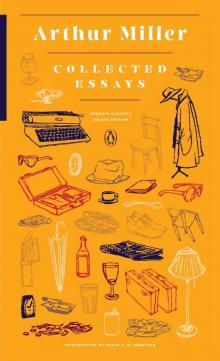 Collected Essays
Collected Essays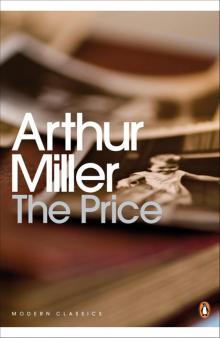 The Price
The Price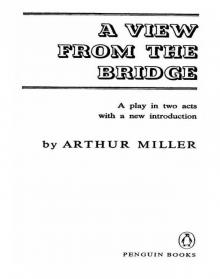 A View from the Bridge
A View from the Bridge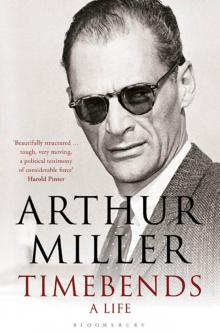 Timebends
Timebends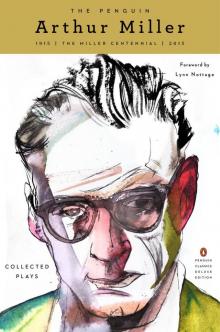 The Penguin Arthur Miller
The Penguin Arthur Miller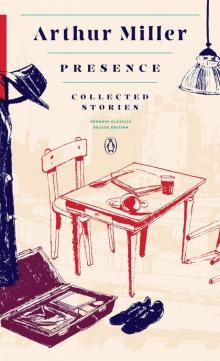 Presence
Presence